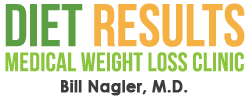HCG is a placebo. Not only that, it’s a dangerous placebo. The American Society of Bariatric Physicians has
condemned the use of HCG for weight loss. It you are taking HCG – by injection, drops, tablets or nasal spray,
stop immediately. The summary and conclusions of the ASBP Position Statement are below.
History
Human Chorionic Gonadotropin (HCG) is a hormone normally secreted by the trophoblastic cells of the placenta
during pregnancy. It was first described as a treatment for obesity in conjunction with a very low calorie diet by
Dr. A. Simeons in 1954 [1]. The Simeons method consisted of a rigid diet of about 500 calories per day
combined with 125 units of HCG injected six days per week for 8 weeks. For each of the two meals permitted
daily, patients were instructed to select one item from each of four food groups, protein, vegetable, bread, and
fruit. For protein servings patients were told to select from the following list: 3.5 ounces of meat, 3.75 ounces of
fish, 4 ounces of Hoop cheese, or 6 egg whites. The latter two choices were to be selected occasionally [2]. The
protein intake on the Simeons diet therefore ranged from about 45 to 50 grams per day. The Simeons method
was very popular in the 1970s and advocates claimed that the method had numerous advantages including rapid
weight loss with minimal hunger, no weakness, and dramatic loss of fat in the stomach, hips, thighs, and upper
arms. After a series of clinical trials disputing the effectiveness of the Simeons Method it fell from favor, but
popular demand for HCG in the treatment of obesity has recently resurfaced in the United States. HCG is
currently available for injection and as sublingual tablets.
Discussion
Although there were a few early studies in agreement with Simeons recommendations [2-3], a number of
subsequent studies produced evidence that the HCG in the Simeons method was ineffectual and that the weight
loss was entirely due to the diet [4-7]. A meta-analysis review in 1995 of prior studies concluded that there is no
scientific evidence that HCG is effective in the treatment of obesity [8]. The meta-analysis found insufficient
evidence supporting the claims that HCG is effective in altering fat-distribution, hunger reduction or in inducing a
feeling of well-being. The authors stated “…the use of HCG should be regarded as an inappropriate therapy for
weight reduction…” In the authors opinion, “Pharmacists and physicians should be alert on the use of HCG for
Simeons therapy. The results of this meta-analysis support a firm standpoint against this improper indication.
Restraints on physicians practicing this therapy can be based on our findings.” PubMed and Google Scholar
searches (on December 2, 2009) revealed no favorable reports on the Simeons method since the 1995 metaanalysis.
On the other hand, no significant harmful effects of HCG injections have been described in the medical
literature. The diet employed in the Simeons method provides a daily protein intake below that recommended by
the RDA for most patients. The caloric intake of the Simeons diet is similar to that of a VLCD but the protein
intake is lower than that prescribed for VLCDs in current use. Indeed, in the last few years several well-known
researchers have produced evidence that most adults benefit from protein intakes well above the minimum RDA
and that intakes higher than the minimum RDA improve weight loss during caloric restriction diets [9-10]. A
further criticism of the Simeons diet is that the amounts of protein per serving recommended do not reach 30
grams, the threshold dose required for initiation of muscle protein synthesis [11-14]. Although the required
amount of daily protein intake is still controversial, most bariatric practitioners will agree that caloric restriction
diets should provide more than the minimum recommended by the RDA. Recent studies indicate that HCG
injections in men, especially men with testosterone deficiency, can produce a slight gain in muscle mass, thought
to be due to rises in testosterone levels [15]. The doses in the latter study were 250 units twice weekly.
However, no studies have been reported of muscle mass changes in patients before and after weight loss with the
Simeons method. Therefore one cannot assume that weight loss with the Simeons method will result in a net gain
in muscle mass. There are no reports in the medical literature regarding the effectiveness of sublingual HCG.
Summary:
Numerous clinical trials have shown HCG to be ineffectual in producing weight loss. HCG injections can induce a
slight increase in muscle mass in androgen-deficient males. The diet used in the Simeons method provides a lower
protein intake than is advisable in view of current knowledge and practice. There are few medical literature
reports favorable to the Simeons method; the overwhelming majority of medical reports are critical of it.
Physicians employing either the HCG or the diet recommended by Simeons may expose themselves to criticism
from other physicians, from insurers, or from government bodies.
Conclusions:
It is the position of the American Society of Bariatric Physicians that:
1. The Simeons method for weight loss is not recommended.
2. The Simeons diet is not recommended.
3. The use of HCG for weight loss is not recommended.

